Do Solar Panels Help Climate Change?
Firstly, climate change has become a pressing global issue, driven by the burning of fossil fuels and the resulting greenhouse gas emissions. Furthermore as temperatures rise and extreme weather events become more frequent, the search for sustainable energy solutions intensifies. In fact, solar panels have emerged as a promising technology. But, do solar panels help climate change? This article explores the impact of solar panels on the environment. Delving into their potential to mitigate climate change and improve air quality.
The Environmental Impact of Solar Panels
How Solar Panels Work
Solar panels, or photovoltaic (PV) panels, harness the sun’s energy to generate electricity. Since this process involves converting solar radiation into electrical power using semiconductor materials. Thus the generated electricity can power homes, businesses, and even feed into the power grid, reducing reliance on fossil fuels. Read How Solar Energy Works Diagram for more information.
Reducing Greenhouse Gas Emissions
One of the primary ways solar panels help combat climate change is by reducing greenhouse gas emissions. Traditional energy sources, such as coal-fired power plants and natural gas, emit significant amounts of carbon dioxide and other harmful gases.
In contrast, solar energy systems produce zero emissions during operation. Thus this transition from fossil fuels to solar energy can lead to a substantial decrease in total emissions. Contributing to the mitigation of climate change.
Lowering Carbon Footprint
Solar panels significantly reduce the carbon footprint of energy production. While the manufacturing process of solar panels is energy-intensive and involves emissions, the overall carbon footprint is much lower compared to non-renewable energy sources. Over the lifespan of a solar installation, the reduction in carbon emissions far outweighs the initial environmental costs.
Economic and Environmental Benefits

Economic Growth and Job Creation
Obviously, the solar industry is experiencing a rapid growth rate, creating numerous jobs and stimulating economic growth. Hence as more solar projects are developed, the demand for skilled labor increases. Leading to job creation in manufacturing, installation, and maintenance of solar systems. This economic growth further supports the transition to a more sustainable future.
Improving Air Quality
Air pollution from burning fossil fuels contributes to numerous health issues, including respiratory problems and premature deaths. Therefore by reducing the use of fossil fuels, solar panels help improve air quality and public health. This reduction in harmful emissions also has a positive impact on the environment, helping to preserve natural resources and ecosystems.
Solar Panels and Climate Change Mitigation
Impact on Global Warming
The use of solar energy systems can help slow global warming by decreasing the amount of greenhouse gases released into the atmosphere. Evidently, as solar power becomes more widespread, the reliance on fossil fuels diminishes, leading to a reduction in global temperature increases. This cooling effect can help mitigate some of the harmful effects of climate change. Such as extreme weather events and rising sea levels.
Role in Climate Change Mitigation
Solar panels play a crucial role in climate change mitigation efforts. By providing a clean and renewable source of energy, they help reduce the overall environmental impact of human activities.
The adoption of solar technology on a large scale can lead to significant decreases in global greenhouse gas emissions. Contributing to the stabilization of climate patterns and the preservation of ecosystems for future generations.
Do Solar Panels Help Climate Change?: Frequently Asked Questions
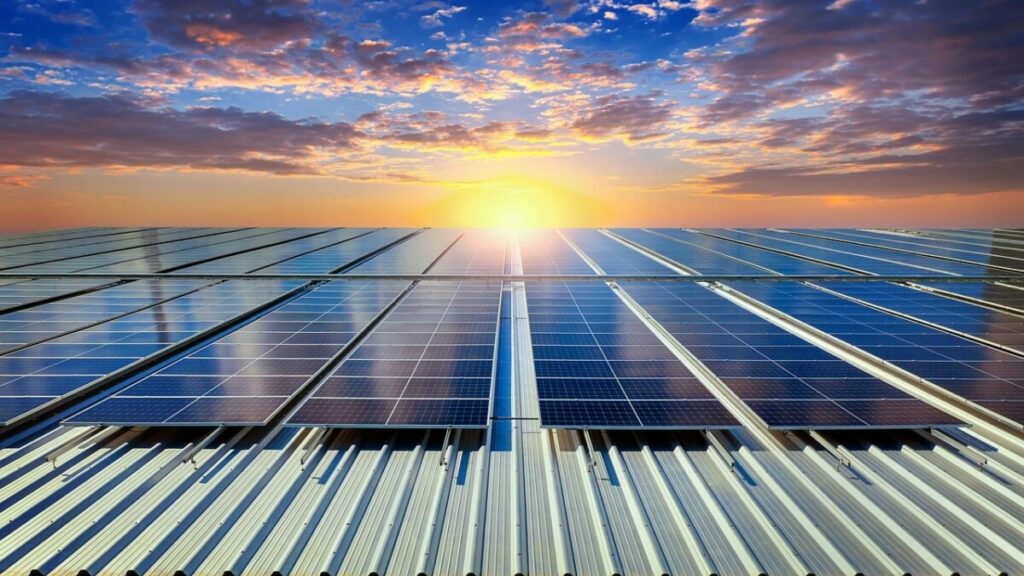
How do solar panels help reduce greenhouse gas emissions?
Solar panels generate electricity without emitting greenhouse gases, unlike fossil fuel-based power sources. This reduction in emissions helps combat global warming and improves air quality.
Are solar panels environmentally friendly during their entire lifecycle?
While the manufacturing process of solar panels does involve some emissions, their overall carbon footprint is much lower than that of traditional energy sources. The environmental benefits during their operational life outweigh the initial impacts.
Can solar panels help reduce energy costs?
Yes, solar panels can significantly reduce energy costs by providing a sustainable and cost-effective source of electricity. They also offer long-term savings on energy bills and reduce dependency on non-renewable energy sources.
What is the role of solar panels in climate change mitigation?
Solar panels help mitigate climate change by reducing reliance on fossil fuels. Decreasing greenhouse gas emissions, and promoting the use of renewable energy sources. This transition contributes to the stabilization of global climate patterns and the preservation of natural resources.
How widespread is the use of solar energy?
In recent years, the use of solar energy has grown significantly worldwide. Countries like the United States have seen substantial increases in solar installations. Driven by advancements in solar technology and government incentives.
By exploring the numerous benefits and applications of solar panels, it becomes evident that they play a vital role in addressing climate change. The subsequent sections will delve deeper into specific aspects of solar energy and its impact on the environment.
How Solar Panels Help Climate Change
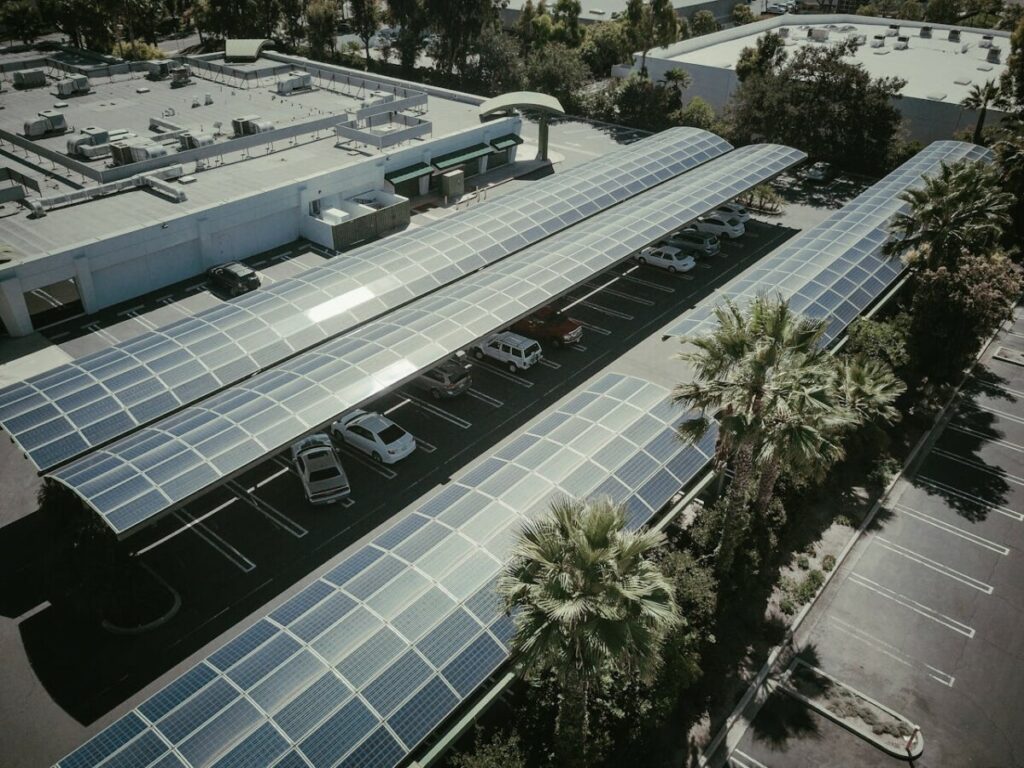
Solar Panels and Energy Consumption
Solar panels contribute to a reduction in energy consumption from traditional power plants. By generating electricity from the sun, solar systems provide an alternative to energy derived from fossil fuels. This shift decreases the need for coal, natural gas, and other non-renewable sources. Thus reducing the overall carbon emissions associated with energy production.
Impact on Urban Areas
In urban areas, solar panels can be particularly effective in combating the urban heat island effect. The deployment of solar panels on rooftops and in solar farms within cities can help reduce the temperature of buildings and surrounding environments. This cooling effect not only mitigates the localized impact of climate change but also reduces the energy required for air conditioning. Further lowering greenhouse gas emissions.
Solar Energy and the Power Grid
Integrating solar energy into the power grid can enhance its stability and reliability. During peak sunlight hours, solar panels generate surplus electricity that can be fed into the grid. Reducing the load on conventional power plants. This integration helps balance energy supply and demand. Potentially lowering the incidence of blackouts and other power disruptions caused by extreme weather events.
Advancements in Solar Technology
Recent advancements in solar technology have improved the efficiency and affordability of solar panels. Innovations such as bifacial solar panels, which capture sunlight from both sides, and advancements in energy storage solutions like lithium-ion batteries, have made solar energy more accessible and practical for widespread use.
These technological improvements contribute to the increasing adoption of solar energy and its role in climate change mitigation.
Environmental Concerns and Solutions
Despite their benefits, solar panels are not without environmental concerns. The manufacturing process of solar panels involves the use of certain hazardous materials and can be energy-intensive. However, ongoing research and development are focused on making the production process more sustainable.
Recycling programs and advancements in material science are being developed. To address these environmental concerns and reduce the overall carbon footprint of solar panels.
The Role of Solar Farms and Large-Scale Installations
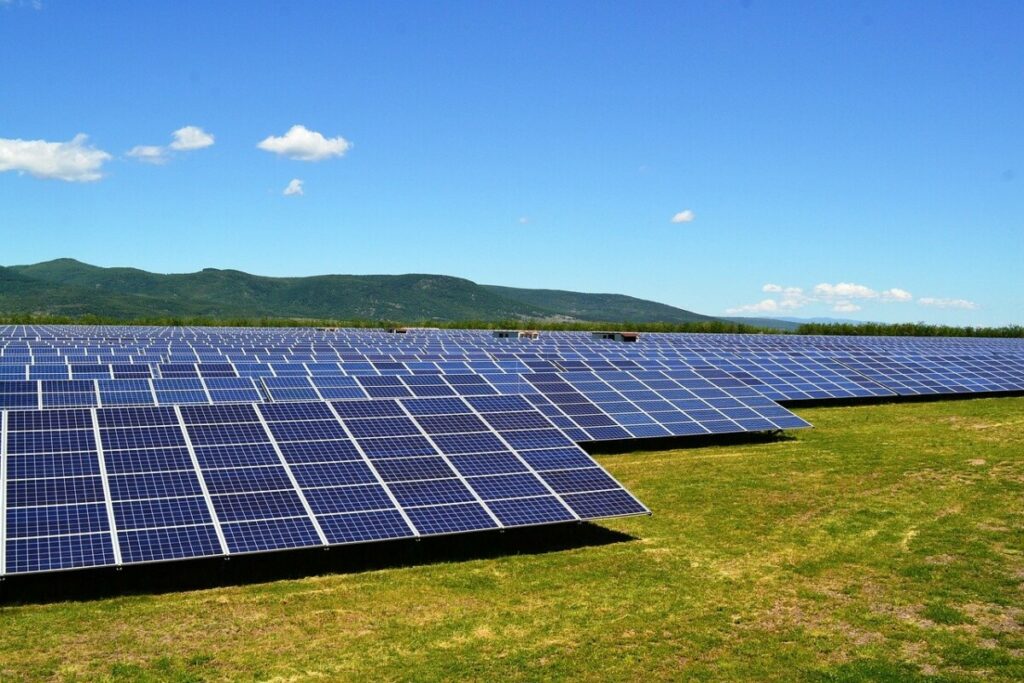
Solar Farms and Their Benefits
Solar farms, which consist of large arrays of solar panels, can generate significant amounts of clean electricity. Moreover these large-scale installations can power entire communities, reduce reliance on fossil fuels, and lower carbon emissions on a regional scale.
Therefore by converting vast areas of land into solar energy production sites, solar farms contribute to the mitigation of climate change and promote the use of renewable energy sources.
Case Study: National Renewable Energy Laboratory
The National Renewable Energy Laboratory (NREL) has been at the forefront of solar energy research and development.
Through various projects and collaborations, NREL has demonstrated the potential of solar energy systems to reduce greenhouse gas emissions and support climate change mitigation efforts. Their studies highlight the effectiveness of solar farms and large-scale solar installations in providing sustainable energy solutions.
Do Solar Panels Help Climate Change?: Frequently Asked Questions (Continued)
How do solar panels affect the economy?
Solar panels stimulate economic growth by creating jobs in manufacturing, installation, and maintenance. The solar industry’s growth rate contributes to the economy by reducing energy costs and promoting the development of new technologies.
What are the environmental benefits of solar panels?
Solar panels reduce harmful emissions, lower the carbon footprint of energy production, and improve air quality. They help preserve natural resources and mitigate the effects of climate change by providing a clean, renewable source of energy.
Can solar energy be stored for use at night or during cloudy days?
Yes, solar energy can be stored using batteries and other energy storage solutions. Advances in storage technology, such as lithium-ion batteries, have made it possible to store surplus solar energy for use during non-sunny periods, ensuring a reliable power supply.
What is the potential of solar panels in reducing global temperatures?
By decreasing the reliance on fossil fuels and reducing greenhouse gas emissions, solar panels can contribute to a cooling effect on global temperatures. This impact is essential for slowing down the rate of global warming and mitigating extreme weather events.
Are there any government incentives for installing solar panels?
Many governments offer incentives such as tax credits, rebates, and grants to encourage the adoption of solar energy. These incentives make it more affordable for individuals and businesses to invest in solar technology, accelerating the transition to renewable energy.
Do Solar Panels Help Climate Change Conclusion
The deployment of solar panels plays a crucial role in combating climate change by reducing greenhouse gas emissions, improving air quality, and providing a sustainable source of energy.
The continued advancement of solar technology and the expansion of solar farms and large-scale installations further enhance the potential of solar energy to mitigate climate change.
So through the combined efforts of individuals, businesses, and governments, the use of solar energy can contribute to a more sustainable future for future generations.
Solar Panels and Global Climate Impact

Influence on Global Temperature
Solar panels help reduce global temperature by decreasing the need for fossil fuel-based energy production, which is a significant source of greenhouse gas emissions.
As more solar energy systems are installed, the reliance on coal, natural gas, and oil diminishes, leading to a reduction in the overall amount of greenhouse gases released into the atmosphere. Therefore this reduction helps slow down the warming of the planet, mitigating the effects of global warming and contributing to the stabilization of climate patterns.
Reduction of Harmful Emissions
By harnessing the power of the sun, solar panels generate electricity without producing harmful emissions. Unlike traditional power plants that release carbon dioxide, nitrous oxide, and other pollutants, solar installations provide clean energy that does not degrade air quality or contribute to the greenhouse effect.
his reduction in harmful emissions has a profound impact on both the environment and public health, leading to fewer premature deaths and respiratory illnesses caused by air pollution.
Support for Electric Vehicles
The rise of electric vehicles (EVs) complements the use of solar panels in reducing carbon emissions. As more individuals and businesses switch to EVs, the demand for electricity increases. Solar power can meet this demand sustainably, providing clean energy to charge EVs and further reducing the carbon footprint associated with transportation.
This synergy between solar energy and electric vehicles enhances the overall effort to combat climate change and decrease reliance on fossil fuels.
Benefits for Urban and Rural Areas
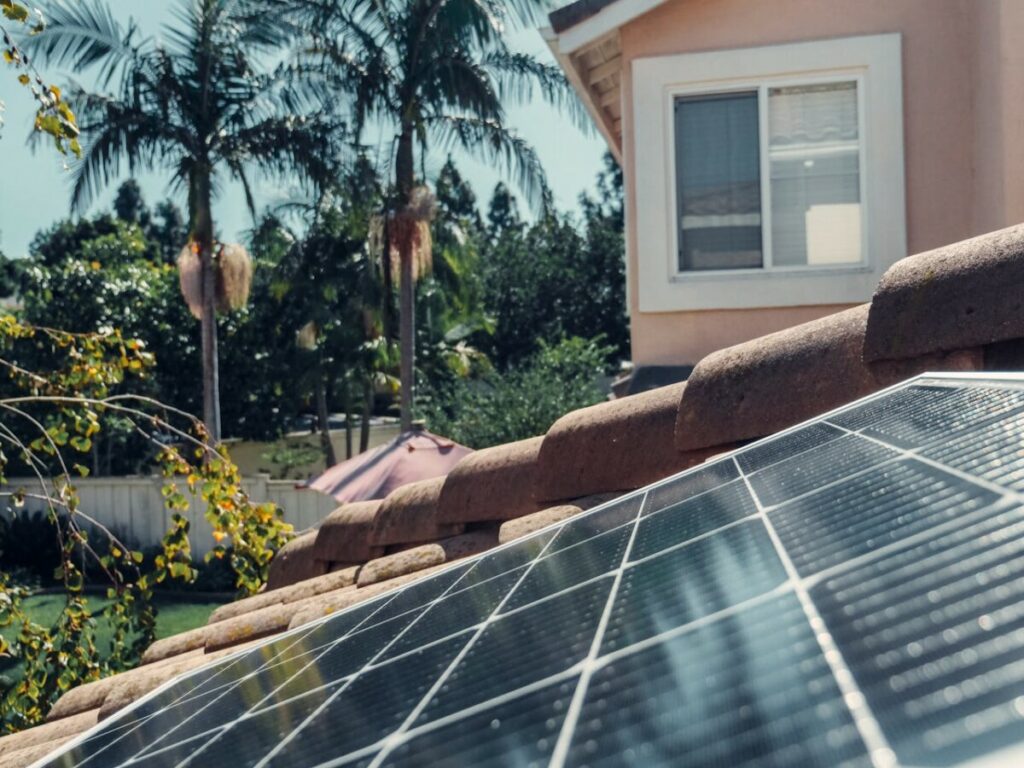
Urban Heat Island Effect
Urban areas are particularly vulnerable to the effects of climate change due to the urban heat island effect, where cities experience higher temperatures than surrounding rural areas.
Solar panels can help mitigate this effect by providing shade and reducing the need for air conditioning, which in turn lowers energy consumption and greenhouse gas emissions. Installing solar panels on rooftops and in urban spaces can significantly decrease the ambient temperature, improving the quality of life for city residents. Read Unlocking the Best 33 Benefits of Residential Solar Panels for more information.
Solar Energy in Rural Areas
In rural areas, where access to the traditional power grid may be limited, solar panels offer a viable solution for energy independence. Therefore solar farms and off-grid solar systems can provide reliable electricity to remote communities, reducing their reliance on diesel generators and other non-renewable energy sources. Indeed this access to clean energy promotes sustainable development and improves the quality of life in rural regions.
Solar Power Plants and Their Role
Large-scale solar power plants are instrumental in the global effort to reduce greenhouse gas emissions. Hence these installations generate vast amounts of electricity, which can power thousands of homes and businesses. By offsetting the energy produced by fossil fuel plants, solar power plants help decrease the overall carbon emissions, contributing to climate change mitigation on a global scale.
Do Solar Panels Help Climate Change: Frequently Asked Questions (Continued)
How does solar energy compare to other renewable energy sources?
Solar energy is one of the most abundant and accessible renewable energy sources. Unlike wind or hydroelectric power, which may be limited by geographic location and weather conditions, solar energy can be harnessed almost anywhere. Advances in solar technology continue to improve efficiency and reduce costs, making it a competitive and viable option for clean energy production.
What is the carbon footprint of solar panels compared to fossil fuels?
The carbon footprint of solar panels is significantly lower than that of fossil fuels. While the manufacturing process of solar panels does produce some emissions, these are minimal compared to the emissions generated by burning fossil fuels over the same period. Over their operational lifespan, solar panels prevent far more carbon emissions than are created during their production, making them a key component in reducing global carbon footprints.
Can solar panels be recycled?
Yes, solar panels can be recycled. Many of the materials used in solar panels, such as glass, aluminum, and certain semiconductor materials, can be reclaimed and reused. Recycling programs and advancements in material recovery processes are being developed to ensure that the environmental impact of decommissioned solar panels is minimized.
How do solar panels affect local wildlife?
Solar installations, particularly large solar farms, can impact local wildlife and ecosystems. However, proper site selection and management practices can minimize these effects. Many solar farms are designed with wildlife corridors and other mitigation measures to protect local species and habitats.
What is the future of solar energy?
The future of solar energy is promising, with ongoing advancements in technology, storage solutions, and policy support driving increased adoption. As costs continue to decline and efficiency improves, solar energy is expected to play a central role in the transition to a more sustainable and resilient global energy system.

Do Solar Panels Help Climate Change Conclusion
The adoption of solar panels is a critical step in addressing climate change. By reducing greenhouse gas emissions, improving air quality, and providing a sustainable energy source, solar technology offers a viable solution to the environmental challenges we face.
With continued innovation and support, solar panels can help pave the way for a more sustainable future, ensuring that future generations inherit a healthier planet.
As we strive to combat climate change, the role of solar energy cannot be overstated, making it essential for individuals, businesses, and governments to embrace and invest in this clean energy technology.
Solar Panels: A Path to Sustainable Development
Long-term Environmental Benefits
The long-term environmental benefits of solar panels extend far beyond immediate reductions in greenhouse gas emissions. By promoting the widespread adoption of solar energy, we can ensure a more sustainable and resilient global energy system.
This shift will reduce the strain on natural resources, protect biodiversity, and help maintain the delicate balance of ecosystems affected by climate change. Over time, the cumulative impact of solar energy systems can lead to significant improvements in global climate health.
Contribution to Economic Stability
Solar panels also contribute to economic stability by reducing energy costs and enhancing energy security. As solar technology becomes more affordable, individuals and businesses can invest in solar installations, leading to long-term savings on energy bills.
Additionally, the decentralized nature of solar energy reduces the vulnerability of the power grid to disruptions caused by extreme weather events, ensuring a more reliable energy supply.
Role in Climate Change Mitigation Strategies
Integrating solar panels into broader climate change mitigation strategies is essential. Solar energy can work in tandem with other renewable energy sources, such as wind and hydroelectric power, to create a diversified and resilient energy mix. This comprehensive approach can significantly reduce greenhouse gas emissions and drive progress towards global climate targets.
Addressing Environmental Concerns
While solar panels offer numerous benefits, it is crucial to address any environmental concerns associated with their production and disposal.
Efforts to improve the sustainability of the manufacturing process and enhance recycling programs are essential. By adopting a lifecycle approach to solar panel management, we can minimize their environmental impact and ensure that the benefits of solar energy are maximized.
The Future of Solar Energy and Climate Change

Innovations in Solar Technology
The future of solar energy is bright, with ongoing innovations poised to further enhance the efficiency and affordability of solar panels.
Emerging technologies, such as perovskite solar cells and solar windows, have the potential to revolutionize the solar industry. These advancements will enable greater integration of solar energy into urban environments and increase the overall adoption of clean energy solutions.
Global Commitment to Renewable Energy
Global commitment to renewable energy is critical for the successful mitigation of climate change.
International agreements and national policies that support the development and deployment of solar energy can accelerate the transition to a low-carbon economy. By fostering collaboration and sharing best practices, countries can work together to overcome challenges and achieve their climate goals.
Educating and Empowering Communities
Educating and empowering communities about the benefits of solar energy is vital. Public awareness campaigns, educational programs, and incentives can encourage individuals and businesses to invest in solar technology.
By making solar energy accessible and appealing, we can drive widespread adoption and create a groundswell of support for clean energy initiatives.
Ensuring a Sustainable Future for All
Ultimately, the widespread adoption of solar panels is essential for ensuring a sustainable future for all.
By reducing greenhouse gas emissions, improving air quality, and promoting economic growth, solar energy can help mitigate the harmful effects of climate change and create a healthier planet for future generations. The power of the sun, harnessed through innovative solar technology, offers a path towards a more sustainable and equitable world.
Do Solar Panels Help Climate Change Conclusion
In conclusion, the question of “do solar panels help climate change?” can be answered with a resounding yes. Solar panels play a pivotal role in reducing greenhouse gas emissions, lowering carbon footprints, and mitigating the adverse effects of climate change.
The environmental benefits of solar panels, combined with their economic and social advantages, make them a cornerstone of sustainable development. As we continue to innovate and expand the use of solar energy, we pave the way for a more resilient and sustainable future.
By embracing solar technology, we can protect our planet, enhance our quality of life, and ensure that future generations inherit a world that thrives.
Do Solar Panels Help Climate Change: Frequently Asked Questions (Final Section)
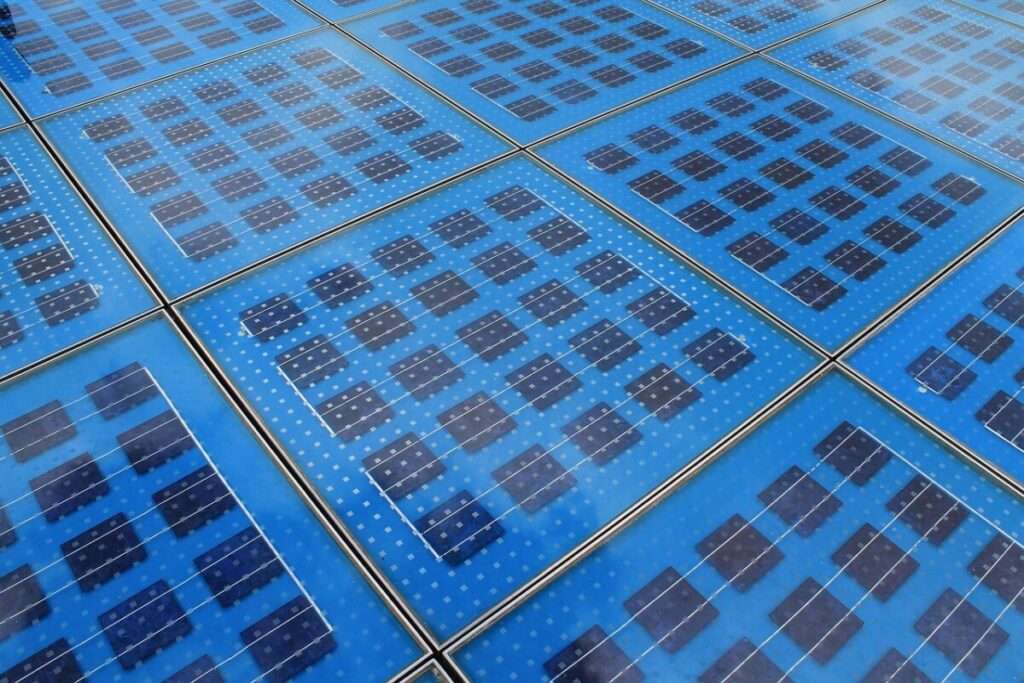
How do solar panels integrate with the power grid?
Solar panels can integrate with the power grid through net metering and grid-tied systems. Net metering allows excess electricity generated by solar panels to be fed back into the grid, providing credits that offset electricity costs. Grid-tied systems ensure a seamless supply of electricity, even when solar generation is low.
What incentives are available for solar energy adoption?
Many governments offer various incentives to promote solar energy adoption, including tax credits, rebates, grants, and feed-in tariffs. These incentives can significantly reduce the initial cost of solar installations and make solar energy more accessible to a broader range of consumers.
How do solar panels perform in different weather conditions?
Solar panels are designed to perform well in various weather conditions, including cloudy and rainy days. While their efficiency is highest under direct sunlight, modern solar panels can still generate electricity in diffuse light conditions. Additionally, advancements in technology continue to improve their performance and reliability in diverse climates.
What are the social benefits of solar energy?
Solar energy provides numerous social benefits, including job creation, energy independence, and improved public health. By reducing air pollution and reliance on non-renewable energy sources, solar energy contributes to healthier communities and greater energy security.
Can solar panels be installed on any type of building?
Solar panels can be installed on a wide range of building types, including residential, commercial, and industrial structures. Advances in mounting systems and flexible solar panels have expanded the possibilities for installation, allowing for greater adaptability and integration into various architectural designs.
So, by addressing these frequently asked questions and highlighting the multifaceted benefits of solar energy, it becomes clear that solar panels are a vital tool in the fight against climate change. Through continued innovation, education, and global commitment, solar energy can help create a sustainable and prosperous future for all.
Finally, thank you for taking the time to read this article “Do Solar Panels Help Climate Change?” If you found this information valuable, please consider sharing it with your friends and on social media. By spreading the word, you can help raise awareness about the benefits of solar energy, encourage more people to adopt sustainable practices, and contribute to the global effort to reduce greenhouse gas emissions. Together, we can make a significant impact on our planet’s future. Share now and be a part of the solution! Thank you.
Recent Posts
Understanding Energy and Electricity: The Power For Progress
Energy and Electricity Energy and electricity are integral components of modern life, powering everything from homes and businesses to transportation and communication. Without them, the...
The Future of Wind Energy The future of wind energy is set to play a critical role in addressing global energy needs while combating climate change. As renewable energy sources like wind and...


